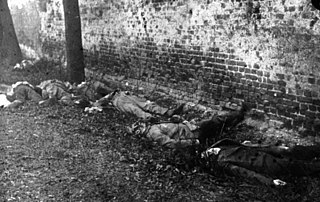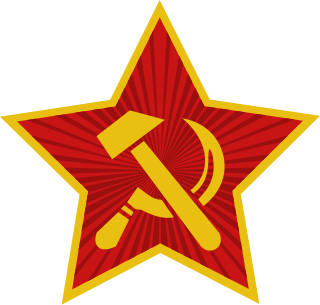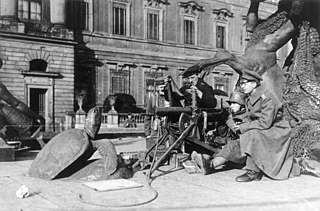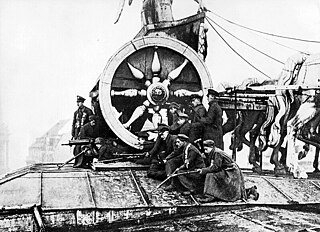 W
WThe German Revolution or November Revolution was a civil conflict in the German Empire at the end of the First World War that resulted in the replacement of the German federal constitutional monarchy with a democratic parliamentary republic that later became known as the Weimar Republic. The revolutionary period lasted from November 1918 until the adoption of the Weimar Constitution in August 1919. Among the factors leading to the revolution were the extreme burdens suffered by the German population during the four years of war, the economic and psychological impacts of the German Empire's defeat by the Allies, and growing social tensions between the general population and the aristocratic and bourgeois elite.
 W
WKaiser Wilhelm II abdicated as German Emperor and King of Prussia in November 1918. The abdication was announced on 9 November by Prince Maximilian of Baden and was formally enacted by Wilhelm's written statement on 28 November, made while in exile in Amerongen, the Netherlands. This ended the House of Hohenzollern's 500-year rule over Prussia and its predecessor state, Brandenburg. Wilhelm ruled Germany and Prussia from 15 June 1888 through 9 November 1918, when he went into exile. Following the abdication statement and German Revolution of 1918–19, the German nobility as a legally defined class was abolished. On promulgation of the Weimar Constitution on 11 August 1919, all Germans were declared equal before the law. Ruling princes of the constituent states of Germany also had to give up their monarchical titles and domains, of which there were 22. Of these princely heads of state, four held the title of king (König), six held the title of grand duke (Großherzog), five held the title of duke (Herzog), and seven held the title prince.
 W
WThe Bauer cabinet was the second democratically elected Reichsregierung of the German Reich. It was named after Reichsministerpräsident Gustav Bauer and took office on 21 June 1919 when it replaced the Cabinet Scheidemann. Although the Weimar Constitution was not in force yet, it is generally counted as the second government of the Weimar Republic.
 W
WThe People's State of Bavaria was a short-lived socialist state in Bavaria from 1918 to 1919. The People's State of Bavaria was established on 8 November 1918 during the German Revolution, as an attempt at a socialist state to replace the Kingdom of Bavaria. The state was led by Kurt Eisner until his assassination in February 1919, and co-existed with the rival Bavarian Soviet Republic from 6 April 1919, with its government under Johannes Hoffmann exiled in Bamberg. The People's State of Bavaria was dissolved upon the establishment of the Free State of Bavaria on 14 August 1919.
 W
WThe Bavarian or Munich Soviet Republic was a short-lived unrecognised socialist state in Bavaria during the German Revolution of 1918–19. It took the form of a workers' council republic. Its name is also sometimes rendered in English as the Bavarian Council Republic; the German term Räterepublik means a republic of councils or committees: council or committee is also the meaning of the Russian word soviet. It was established in April 1919 after the demise of Kurt Eisner's People's State of Bavaria and sought to establish a socialist soviet republic in Bavaria. It was overthrown less than a month later by elements of the German Army and the paramilitary Freikorps. Its collapse helped the Nazi Party in its subsequent rise to power.
 W
WThe Berlin March Battles of 1919 were the final decisive phase of the German Revolution of 1918–1919. The events were the result of a general strike by the Berlin working class to enforce the widely anticipated socialization of key industries, as well as the legal safeguarding of the workers' and soldiers' councils and thus the democratization of the military. The strike action was met with violence from the paramilitary Freikorps, resulting in street fighting and house-to-house fighting around the Alexanderplatz and the city of Lichtenberg.
 W
WThe Bremen Soviet Republic was an unrecognised, short-lived state, existing for 25 days in 1919. It consisted of the state of Bremen, Germany. The republic was established amid the German Revolution.
 W
WA Soldiers' Council was established in Brussels on 10 November 1918 after news of the naval mutiny at Kiel and the November Revolution reached German troops in German-occupied Belgium in the final days of World War I. Intended as a kind of revolutionary council and socialist and communist in inspiration, it was created after the soldiers mutinied against their officers and seized control of Brussels which had been occupied since August 1914. They tried unsuccessfully to create an alliance with Belgian civilians and socialists and there was sporadic fighting in the city between right-wing and revolutionary soldiers. At the same time, the Soldiers' Council struggled to maintain law and order. Its chief concern was to secure the repatriation of its men to Germany. After a few days, the council disbanded and the final German troops left Brussels on 16 November. The Belgian Army under King Albert I finally entered the city on 22 November 1918.
 W
WCabinet Müller I or the first Cabinet Müller was the third democratically elected government of Germany and the second in office after the Weimar Constitution came into force in August 1919. It was named after the new Chancellor (Reichskanzler) Hermann Müller of the Social Democratic Party of Germany (SPD). The cabinet was based on the same three centre-left parties as the previous one: the SPD, the German Center Party (Zentrum) and the German Democratic Party (DDP). It was formed in March 1920 after the resignation of the Cabinet Bauer. The Cabinet Müller resigned in reaction to the outcome of the Reichstag elections of 6 June 1920.
 W
WThe Communist Party of Germany was a major political party in the Weimar Republic between 1918 and 1933, an underground resistance movement in Nazi Germany, and a minor party in West Germany in the postwar period until it was banned in 1956.
 W
WThe Council of the People's Deputies was the name given to the government of the November Revolution in Germany from November 1918 until February 1919. The Council de facto took over the function of head of state (Kaiser) and head of government (Chancellor), and issued decrees replacing the legislation of parliament (Reichstag) and Federal Council. The state secretaries stayed in office or were replaced by the Council.
 W
WDrums in the Night is a play by the German playwright Bertolt Brecht. Brecht wrote it between 1919 and 1920, and it received its first theatrical production in 1922. It is in the Expressionist style of Ernst Toller and Georg Kaiser. The play—along with Baal and In the Jungle—won the Kleist Prize for 1922 ; the play was performed all over Germany as a result. Brecht later claimed that he had only written it as a source of income.
 W
WFreikorps were irregular German and other European military volunteer units, or paramilitary, that existed from the 18th to the early 20th centuries. They effectively fought as mercenary or private armies, regardless of their own nationality. In German-speaking countries, the first so-called Freikorps were formed in the 18th century from native volunteers, enemy renegades, and deserters. These sometimes exotically equipped units served as infantry and cavalry, sometimes in just company strength, sometimes in formations up to several thousand strong. There were also various mixed formations or legions. The Prussian von Kleist Freikorps included infantry, jäger, dragoons and hussars. The French Volontaires de Saxe combined uhlans and dragoons.
 W
WThe Kiel mutiny was a major revolt by sailors of the German High Seas Fleet on 3 November 1918. The revolt triggered the German revolution which was to sweep aside the monarchy within a few days. It ultimately led to the end of the German Empire and to the establishment of the Weimar Republic.
 W
WNovember 1918 was the period of transition when the region of Alsace-Lorraine passed from German to French sovereignty at the end of World War I. During this month, international events were linked to domestic troubles, particularly the German Revolution.
 W
WNovember 1918: A German Revolution is a tetralogy of novels by German writer Alfred Döblin about the German Revolution of 1918–1919. The four volumes—Vol. I: Bürger und Soldaten, Vol. II Verratenes Volk, Vol. III, Heimkehr der Fronttruppen, and Vol. IV, Karl und Rosa —together comprise the most significant work from Döblin's period of exile (1933–1945). The work was highly praised by figures such as Bertolt Brecht, and critic Gabriele Sander has described the tetralogy as representing the culmination of Döblin's work in the genre of the historical novel.
 W
WThe People's Courts of Bavaria were Sondergerichte established by Kurt Eisner during the German Revolution in November 1918 and part of the Ordnungszelle that lasted until May 1924 after handing out more than 31,000 sentences. It was composed of two judges and three lay judges. One of its most notable trials was that of the Beer Hall Putsch conspirators, including Adolf Hitler, Erich Ludendorff, Wilhelm Frick, Friedrich Weber, and Ernst Röhm, which lasted from 26 February 1924 until 1 April 1924.
 W
WGermany saw significant political violence from the fall of the German Empire and the rise of the Weimar Republic through the German Revolution of 1918–1919, until the rise of the Nazi Party to power in 1933 when a Nazi totalitarian state was formed and opposition figures were arrested. The violence was characterised by assassinations by and confrontations between right-wing groups such as the Freikorps, and socialist organisations such as the Communist Party of Germany.
 W
WThe Sailor's Song is an East German black-and-white film directed by Kurt Maetzig and Günter Reisch. It was released in 1958.
 W
WThe Soviet Republic of Saxony was a short-lived, unrecognised socialist state during the German Revolution of 1918–19 based in Saxony. Its short history was marred by political strife, violence, and strikes. It ended after the Freikorps took over Leipzig and was restored in 1920, only to be overthrown by the Weimar chancellor in 1923.
 W
WThe Scheidemann cabinet was the first democratically elected Reichsregierung of the German Reich. It took office on 13 February 1919. Although the Weimar Constitution was not in force yet, it is generally counted as the first government of the Weimar Republic. It was based on the Weimar Coalition of centre-left parties. Ministerpräsident Philipp Scheidemann resigned in protest against the Treaty of Versailles on 20 June 1919. His cabinet was followed by the government of Gustav Bauer.
 W
WThe Skirmish of the Berlin Schloss was a small skirmish between the socialist revolutionary Volksmarinedivision and regular German army units on 24 December 1918 during the German Revolution of 1918–19. It took place around the Berlin Schloss also known as "Stadtschloss" in the centre of Berlin, Germany.
 W
WThe Spartacist uprising, also known as the January uprising (Januaraufstand), was a general strike in Berlin from 5 to 12 January 1919. Germany was in the middle of a post-war revolution, and two of the perceived paths forward were social democracy and a council republic similar to the one which had been established by the Bolsheviks in Russia. The uprising was primarily a power struggle between the moderate Social Democratic Party of Germany (SPD) led by Friedrich Ebert and the radical communists of the Communist Party of Germany (KPD), led by Karl Liebknecht and Rosa Luxemburg, who had previously founded and led the Spartacist League (Spartakusbund).
 W
WThe stab-in-the-back myth was an antisemitic conspiracy theory, widely believed and promulgated in right-wing circles in Germany after 1918. The belief was that the German Army did not lose World War I on the battlefield, but was instead betrayed by the civilians on the home front, especially Jews, revolutionary socialists who fomented strikes and labor unrest, and other republican politicians who had overthrown the Hohenzollern monarchy in the German Revolution of 1918–1919. Advocates of the myth denounced the German government leaders who had signed the Armistice on 11 November 1918 as the "November criminals".
 W
WThe Volksmarinedivision was a German paramilitary unit created on 11 November 1918 to defend the German Revolution. It was led by Lieutenant Heinrich Dorrenbach, an officer in the Imperial German Army and a friend of Karl Liebknecht.
 W
WThe Constituent German National Assembly, better known as the Weimar National Assembly, was the constitutional convention and de facto parliament of Germany from 6 February 1919 to 6 June 1920. The assembly drew up the new constitution which was in force from 1919 to 1933, technically remaining in effect even until the end of Nazi rule in 1945. It convened in Weimar, Thuringia, and is the reason for this period in German history becoming known as the Weimar Republic.
 W
WThe Würzburg Soviet Republic was an unrecognised, short-lived state, existing for just 3 days in April 1919. It consisted of the Bavarian district of Lower Franconia, Germany. The republic was established amid the German Revolution.